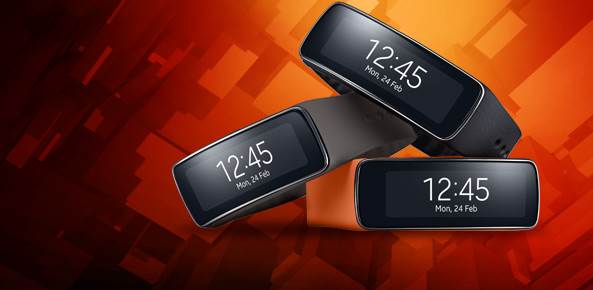![]()
The emerging mobile device category of wearables may soon have a major new entry. According to various reports, Microsoft is prepping a wristband that could represent a significant step in the company’s evolution.
The wristband reportedly will be more oriented toward fitness and health monitoring than smart watch functions. If so, it could resemble the Samsung Gear Fit fitness band. Although telling time might be one of its incidental functions, its key purpose is said to be monitoring a variety of onboard sensors that track heart rate, steps walked, calories burned and other health metrics.
But, more important for the evolution of Microsoft, it apparently will work with phones on the major mobile platforms — devices running Google’s Android and Apple’s iOS, as well as, of course, those using Windows Phone. By contrast, wearables from competitors Samsung and Apple require pairing with phones made by those companies.
Fourth Quarter
The reports, notably in Forbes magazine, Paul Thurrott’s Supersite for Windows and Tom’s Hardware site, point to a release of the wristband by fourth quarter of this year. If so, its timing in relation to the expected launch of Apple’s iWatch in October could seriously affect its reception.
Pricing of the Microsoft device is said to be about the same as Samsung’s Gear Fit, about $ 199. It’s not yet clear if the wristband will be branded as Microsoft, Nokia, Lumia, Surface or some combination.
With Microsoft struggling to improve its small foothold in the smartphone and tablet markets, this could be its best chance to avoid a three-for-three Missed Mobile Opportunity. The wearable market is still emerging, without the kind of dominant market share leaders that exist for smartphones and tablets.
But, in addition to Samsung, competitors in the fitness wristband market already include Fitbit and Jawbone. Some observers expect a Microsoft band would also show texts, e-mails and notifications from a paired smartphone. Additionally, Microsoft’s wearable will reportedly have the display designed to reside on the inside of the wrist, to make looking at the screen more natural and private, and to distinguish it from other models.
Why a Wearable?
There have been reports for months that Microsoft was working on a Windows for wearables. However, while the company may want to continue the Windows brand, it is difficult to see how windows or tiles as a design/navigational scheme would be helpful for such small displays on one’s wrist.
Avi Greengart, an analyst for industry research firm Current Analysis, pointed out to us that Microsoft “tried wearables with the Spot [smart watch] initiative” more than a decade ago, in which it “invested early, but way too early.”
“The real question,” Greengart said, “is what it will take for consumers to adopt wrist wearables — or ‘wristables’ — in a mainstream fashion.”
He noted that health and fitness monitoring functions, or serving as a smart watch extension, do not yet seem to have caught the public’s imagination as “a must-have.”
But Greengart did raise one possibility that could have legs — a wristband that served as an electronic identity bracelet, for keyless and password-less unlocking of car and house doors, logging onto compatible computing devices or smartphones, even for paying without a credit card.
NewsFactor Network






